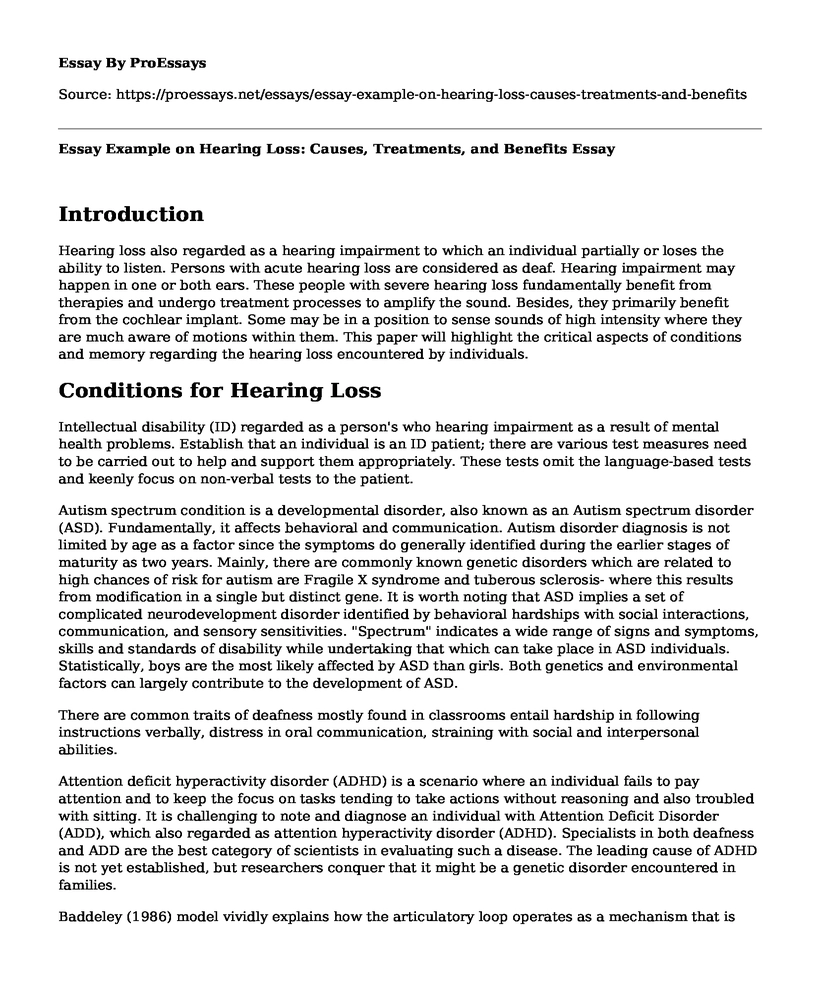Introduction
Hearing loss also regarded as a hearing impairment to which an individual partially or loses the ability to listen. Persons with acute hearing loss are considered as deaf. Hearing impairment may happen in one or both ears. These people with severe hearing loss fundamentally benefit from therapies and undergo treatment processes to amplify the sound. Besides, they primarily benefit from the cochlear implant. Some may be in a position to sense sounds of high intensity where they are much aware of motions within them. This paper will highlight the critical aspects of conditions and memory regarding the hearing loss encountered by individuals.
Conditions for Hearing Loss
Intellectual disability (ID) regarded as a person's who hearing impairment as a result of mental health problems. Establish that an individual is an ID patient; there are various test measures need to be carried out to help and support them appropriately. These tests omit the language-based tests and keenly focus on non-verbal tests to the patient.
Autism spectrum condition is a developmental disorder, also known as an Autism spectrum disorder (ASD). Fundamentally, it affects behavioral and communication. Autism disorder diagnosis is not limited by age as a factor since the symptoms do generally identified during the earlier stages of maturity as two years. Mainly, there are commonly known genetic disorders which are related to high chances of risk for autism are Fragile X syndrome and tuberous sclerosis- where this results from modification in a single but distinct gene. It is worth noting that ASD implies a set of complicated neurodevelopment disorder identified by behavioral hardships with social interactions, communication, and sensory sensitivities. "Spectrum" indicates a wide range of signs and symptoms, skills and standards of disability while undertaking that which can take place in ASD individuals. Statistically, boys are the most likely affected by ASD than girls. Both genetics and environmental factors can largely contribute to the development of ASD.
There are common traits of deafness mostly found in classrooms entail hardship in following instructions verbally, distress in oral communication, straining with social and interpersonal abilities.
Attention deficit hyperactivity disorder (ADHD) is a scenario where an individual fails to pay attention and to keep the focus on tasks tending to take actions without reasoning and also troubled with sitting. It is challenging to note and diagnose an individual with Attention Deficit Disorder (ADD), which also regarded as attention hyperactivity disorder (ADHD). Specialists in both deafness and ADD are the best category of scientists in evaluating such a disease. The leading cause of ADHD is not yet established, but researchers conquer that it might be a genetic disorder encountered in families.
Baddeley (1986) model vividly explains how the articulatory loop operates as a mechanism that is actively involved in retaining temporary information. (Scheetz, 2011)
Articulatory Loop and Relation to Memory
Articulatory Loop (AL) regarded among the two slave systems that exist in tripartite working memory presented in a model. The component to start with is phonologic memory storage which maintains the traces of speech materially based. There are three components of working memory; the central executive responsible for the supervision and controlling of information to and from the slave system, the phonon logic loop, and visual-spatial sketchpad.
Conclusion
I have discovered that the Articulatory loop/system is a collection of all body parts required in speech sounds production. The articulatory system includes speech organs or articulators; lips, teeth, alveolar ridge, hard palate, soft palate, glottis, uvula, and some parts of the tongue. Articulators categorized into two: active and passive articulators. It is worth stating that in the memory store of a human being, there exist two galleries of memory; short term and long term memory.
Reference
Scheetz, N. A. (2011). Deaf education in the 21st century: Topics and trends. Pearson Higher Ed.
Cite this page
Essay Example on Hearing Loss: Causes, Treatments, and Benefits. (2023, Jan 16). Retrieved from https://proessays.net/essays/essay-example-on-hearing-loss-causes-treatments-and-benefits
If you are the original author of this essay and no longer wish to have it published on the ProEssays website, please click below to request its removal:
- Thomson Article: A Defense of Abortion Essay
- Misuse of Opioid-Mediated Placebo in Sports - Essay Sample
- Essay on Aging Care in Australia: Need for Increased Spending for Justice
- Essay on Competent Nurse: Core Values for Successful Career Path
- Essay on Cervical Cancer: Prevention Through Early Screening and HPV Testing
- Research Paper on Nurse Practitioner's Ethical & Legal Issues with Prescribing Medication
- Nursing Self Reflection - Essay Sample







